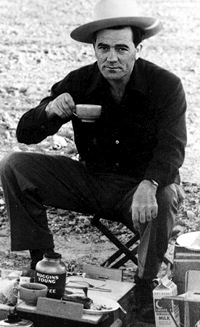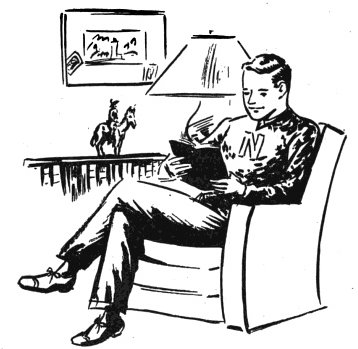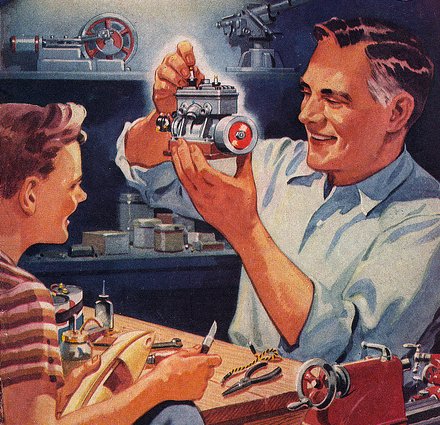
For the first twenty-two years or so of our lives, our main “job†is learning. The bulk of our time is spent in classrooms acquiring new knowledge. And then, once we graduate, we feel like the education phase of our lives is done and now it’s time to go out into the world. Have you ever thought about how odd that idea is? That only a quarter of our lives should be devoted to learning, and then we should simply rest on our laurels for the remaining three-quarters of it?
It’s an erroneous idea – but one many have absorbed, at least subconsciously. But school need not be your exclusive provider of learning. Just because you’ve finished your formal education, doesn’t mean that your education is over!
Many, perhaps most, of history’s greatest men were autodidacts – those who devote themselves to self-education, either in addition to or as a substitute to formal schooling. A fantastic example of this is author Louis L’Amour. L’Amour was one of America’s most prolific and manliest fiction writers. During his career he cranked out over 120 dime Western novels as well as several collections of short stories and poems. What makes Louis L’Amour’s story all the more remarkable is that he was almost entirely self-taught.

Lifelong learner Louis L’Amour
Due to family hardships, L’Amour dropped out of school when he was fifteen and spent the next eight years traveling around the American West working odd jobs on cattle ranches, farms, lumber mills, and even mines. To earn extra money L’Amour boxed in small prizefights around the country and earned a reputation as a formidable opponent. While in his twenties L’Amour became a merchant marine and traveled the globe via steamship.
During all this time, L’Amour was voraciously reading books. As soon as he set foot in a new town, he’d locate the local library. If libraries weren’t around, he’d skip meals so he’d have enough money to order books from catalogs. He was also working on his craft as a budding writer, scribbling notes in cheap notepads that he kept with him all the time.
All of his experiences while traveling, all the books he read, and all the notes he wrote laid the groundwork for his later successful career. But even after L’Amour became an established writer, his pursuit of learning continued and rewarded him greatly. He is a perfect example of the fascinating life one can create for himself when he makes the commitment to be a lifelong learner. (If you want to learn more about L’Amour’s lifelong self-education, pick up a copy of his autobiography, Education of a Wandering Man. Super inspiring read.)
If you want to become the best man you can be, you need to adopt a mindset of lifelong learning. Below we explain why you should become a lifelong learner and how to do it.
Why Become a Lifelong Learner?
“Our whole life is an Education — we are ‘ever-learning,’ every moment of time, everywhere, under all circumstances something is being added to the stock of our previous attainments. Mind is always at work when once its operations commence. All men are learners, whatever their occupation, in the palace, in the cottage, in the park, and in the field. These are the laws stamped upon Humanity.†– Edward Paxton Hood, Self-Education: Twelve Chapters for Young Thinkers, 1852
You’ll earn more. Fifty or sixty years ago, you could finish college and you’d have all the education you needed for the rest of your career. You don’t have that luxury in today’s job market. Skills that were cutting edge five years ago are likely out of date, and the jobs that we will perform in the next decade or two probably don’t even exist yet. If you want to stay competitive in today’s job market and potentially earn more money, you need to become an autodidact.
Not only can becoming a lifelong learner help you earn more money in traditional employment, autodidacticism can be the gateway to self-employment and starting your own business. There are countless examples from history of famous folks who learned how to create thriving businesses without any formal education: Benjamin Franklin, Thomas Edison, and Henry Ford to name just a few. Countless not-so-famous business owners became successful without ever earning a sheepskin too, simply by teaching themselves what they needed to know and relentlessly tinkering.
You’ll be more interesting and charismatic. Those who met Theodore Roosevelt were always greatly impressed with his ability to hold a conversation with anyone regarding any subject imaginable. Scientists were blown away with Roosevelt’s knowledge of complex theories, socialites were smitten with his witty insights about the latest piece by Oscar Wilde, and cowboys out West respected the “Eastern Dude’s†understanding of desert wildlife. How did Theodore Roosevelt become such a charismatic, conversational dynamo? By developing the ability to speed read and then devouring books like a hungry lion feasting on a fresh kill. While in the White House, he would read a book every day before breakfast. If he didn’t have any official business in the evening, he would read two or three more books, plus any magazines and newspapers that caught his fancy. By his own estimates, TR read tens of thousands of books during his lifetime, including hundreds in foreign languages. As a result, he could connect with anyone, from any walk of life, on something that truly interested the other person.
You’ll be a better leader. Being able to connect with others doesn’t just make you more interesting. It also makes you much more influential. The greater your knowledge base, the more you can meet people where they are, and the greater the stockpile of solutions you have at your disposal to tackle problems and overcome challenges.
You’ll be independent and handy. One thing I admired about my grandpa growing up was all the cool stuff that he knew. He was always tinkering, and it seemed like he knew everything about everything. How to hunt, how to shoe a horse, how to garden (he grew grapes), how to make awesome pancakes. Even after he retired, my grandpa was always learning new things and acquiring new skill sets. For example, he learned how to restore antique horse carriages and old phonograph players. He got so good at it, in fact, that he started restoring antique phonograph players as a small side-business.
Because of my grandpa’s diverse range of skills, when something broke or he needed something done, he could do it himself. He didn’t have to call and pay an expert to do it for him. If he didn’t know how to do it, he went to the library, got some books on the subject, and figured it out.
Lifelong learning keeps your brain healthy. Henry Ford said, “Anyone who stops learning is old, whether at twenty or eighty. Anyone who keeps learning stays young. The greatest thing in life is to keep your mind young.†Nearly 100 years later science is validating Henry Ford’s quip. Margie E. Lachman, a psychologist at Brandeis University who specializes in aging says, “Education seems to be an elixir that can bring us a healthy body and mind throughout adulthood and even a longer life.†Her research has shown that the more education an elderly person has – whether obtained formally or informally — the better they performed on cognitive tests than other elderly folks who had less education.
Learning new things can also help stave off old-age ailments like dementia and Alzheimer’s. One study has shown that older folks who stay cognitively active and curious about the world around them are 2.6 times less likely to develop dementia and Alzheimer’s than those who let their minds lie fallow.
You’ll feel more satisfied with life. In his book Drive, author Dan Pink argues that we need three things to feel motivated about, and satisfied with, our life: autonomy, mastery, and purpose. Becoming a lifelong learner fulfills all three of these psychological needs.
When you’re an autodidact you – not your parents, not your professor, not your boss — get to decide what you’re going to learn about. Instead of being a passive consumer of knowledge, you’re actively choosing what you’re learning. In other words, you’re autonomous. As you learn new skills, you’ll enjoy the positive feeling that comes with mastery. And you’ll find yourself with a renewed sense of purpose in life as you set goals for your self-education.
The satisfaction that comes with lifelong learning doesn’t stop there. The more you know about the world, the deeper you can plunge into it, and the more levels of it you can experience. Whether you’re traveling, conversating, visiting a museum, watching a movie, or reading a book, your library of knowledge helps you make connections that you would never have otherwise perceived. The more you learn, the more you realize how many references and meanings you’ve missed because the author/speaker simply took that background knowledge, that fluency in cultural literacy, for granted.
You’ll become more human. As Robert Heinlein famously put it:
“A human being should be able to change a diaper, plan an invasion, butcher a hog, conn a ship, design a building, write a sonnet, balance accounts, build a wall, set a bone, comfort the dying, take orders, give orders, cooperate, act alone, solve equations, analyze a new problem, pitch manure, program a computer, cook a tasty meal, fight efficiently, die gallantly. Specialization is for insects.â€
Common Perceived Barriers to Becoming a Lifelong Learner

People usually give the same excuses for not taking up the mantle of lifelong learning and instead opting for a life filled with mindlessly surfing the net and watching TV.
Time. I get it. You’re busy. I’m sure it’s hard to imagine being able to cram in time for self-study when your day is already packed with work and family. But here’s the thing: As a lifelong learner, you don’t have a deadline on your education. You can take all the time you want and fit it in whenever you’d like. Consequently, you don’t need to spend hours a day reading or practicing. Just 30 minutes here and there spread over months and years will do. Moreover, in my experience, when I consciously make learning a priority, I usually end up finding the time for it (meaning I was previously wasting my time doing other stuff).
There are all sorts of spare moments that you can turn into learning opportunities. Listen to an audiobook during your commute instead of the best hits of the 80s, 90s, and today. Bring a good book to read while you’re waiting to see your doctor instead of thumbing through a two-year-old copy of Sports Illustrated.
Money. This barrier only exists if you think you need formal classes to learn something. You don’t. Thanks to the wonders of the internet you can learn just about anything (and even take college-level classes) at your pace, completely for free. We’ll talk about some of these free sources later on in the post.
Information. As with money, this barrier pretty much no longer exists because of the internet. There might be some skills that will require special in-person instruction, but finding those people is also much easier thanks to the web.
Location. This is only a problem if you think you need to be in a formal classroom to learn. You don’t. You can learn at home, in your car, or in the garage. Granted, there may be some instances in which you’ll need to be in a certain place to be able to learn a new skill (e.g. you can’t learn how to snow ski in Oklahoma), but those instances are typically the exception rather than the rule.
How to Become a Lifelong Learner
Foster a growth mindset. One thing that might be keeping you back from learning new things is the belief that you can’t learn new things. But neuroscience and psychology have shown this to be false. Our brains remain plastic and malleable well into old age, and it’s possible to create new connections among neurons and learn new things even if you’re 80 years old.
To become an effective lifelong learner you need to adopt a mindset that is in line with how our brains really work. Stanford psychologist Carol Dweck discovered that people have one of two “mindsets†– fixed or growth. Individuals with a fixed mindset believe that their intelligence and talents are innate and fixed. They don’t think they can improve with work and effort. Folks with a growth mindset believe that they can improve themselves through work and practice.
You want to foster a growth mindset. How do you do that? Here are a few things Dweck suggests:
- Reading research that shows growth and improvement is possible
- Developing your resiliency
- Trying new things
- Reading about and extracting lessons from others with a growth mindset
Change your idea of learning. Learning doesn’t have to be in a formal classroom setting. In fact, most of the useful stuff you know was probably picked up informally from family, friends, and good old trial and error. To become a lifelong learner, ditch the idea that you need to sign up for a class to actually learn something. Learning opportunities are all around you. Remember that learning isn’t confined to what’s found in books – acquiring practical skill sets is a big part of it too.
Establish goals. What do you want to learn? When do you want to learn it by? Every year, set goals for yourself on skills and knowledge you want to acquire. I usually set three big learning goals for myself every year. For example, this year my goals are to 1) learn how to create compelling videos for AoM, 2) learn how to handle a handgun in defensive situations, and 3) learn how to hunt and field dress a deer.
Besides those three big goals, I always have the daily goal of learning something new every day whether through reading or by talking to other people. To ensure that we have something else to talk about at dinnertime (besides the blog!), Kate and I play a game called “What did you learn today?†(Actually, we say, “Got any stories for me?†It’s our shorthand for, “Have you read or heard anything interesting today?â€) Every day we both try to learn something new to share with each other over dinner.
It can also be motivating to set a reading goal for yourself. For example, AoM’s Managing Editor Jeremy Anderberg has made it his goal to read all 100 of the books on our “100 Must Read Books for Men†list in 100 months, which comes out to just over eight years. No need to rush things! Jeremy wanted to make sure his goal was manageable, and still be able to do other reading as well. One book per month from the list was the perfect solution.
Find your sources. Once you establish your learning goals, it’s time to gather your sources. Do a quick Google search to see what information is available online. After that, head to the library — I always seem to find better and more in-depth insights in books as opposed to web articles. If it’s a skill that will require special instruction, start creating a list of places or individuals that could offer that instruction.
Ask questions. Effective learning requires active participation. You can’t just passively consume information. While you’re reading and talking to experts, ask questions. Don’t know what to ask? Check out this great post we published last year on how to ask questions. Don’t worry about looking or sounding like an idiot. Swallow your pride.
Find a group. While many of your learning goals can be pursued alone, sometimes it helps to have a group of people to learn along with you. Your fellow learners can provide insights and resources that you never would have thought about. Moreover, in a group setting you’ll often get constructive feedback you otherwise wouldn’t get alone. As an added bonus, it’s just more fun to learn with others.
To find a group of folks to learn with, start with the people you know. Maybe you have some friends that want to learn the same thing as you. Start weekly discussions or practice sessions with them. If you can’t find any friends with the same learning goals, check out sites like MeetUp. There’s bound to be a group in your area that focuses on your learning goal. While they don’t provide the same sort of dynamic interaction as in-person groups, online communities can provide a great social learning environment as well.
Practice, practice, practice. Don’t just read or listen your way to knowledge. Try to find a way to put that knowledge to work. If you’re learning about art, visit a museum and try to identify which paintings belong to the Romantic period. If you’re learning about wilderness survival, get out into the wild every month and put those bushcraft skills to use. If you’re learning how to code, code.

Teach what you’re learning.
Teach what you’re learning. One of my all-time favorite books is Stephen Covey’s The Seven Habits of Highly Effective People. One of the skills Covey teaches in the book is that to truly learn something you need to teach it. According to Covey, when we teach, we become truly motivated to learn the material because we want to ensure proper instruction. Teaching also forces us to look at a concept with a beginner’s mind, which can provide the clarity and insight that we were lacking. Moreover, simply talking aloud to somebody can help you solidify ideas through the “production effect.â€
As you learn new things, teach it to others. Blogging is a great way to teach what you’re learning. Many of the skills I’ve acquired in the past five years have come from deciding to write a post about a topic. When I wrote “How to Change the Oil in Your Car,†I had Kate’s Uncle Buzz teach me how; when I wrote “How to Throw a Knife,†I went and spent the day with dude ranch owner Tom Warren; and when Kate and I wrote our series on the history of honor, we read dozens of books and scholarly articles on the subject.
Test yourself. It’s important to get feedback while you’re learning, and testing is the best way to do it. As a self-learner, you’re likely not going to face formal tests, so you’ll need to create your own. How you test yourself will depend on the skill or knowledge set you’re trying to acquire. If you’re learning marksmanship, your test could be the U.S. Army’s rifle marksmanship scorecard; if you’re learning Spanish, your test could be to visit the local Mexican grocery store and talk to the cashier only in Spanish.
Sources for Lifelong Learning
As I mentioned above, there are countless free sources available online. Here are a few of the best:
Blinkist. Blinkist is like a digital SparkNotes for non-fiction books. From business, to philosophy, to history, and more, get snippets of books that can be digested in around 15 minutes. Instantly smarter!
Coursera. Coursera works with top universities from around the world to offer classes online for free. You can take classes from a variety of disciplines including computer sciences, psychology, and Spanish.
OpenStudy. OpenStudy is a social learning network that allows you to connect with individuals with the same learning goals as you.
Khan Academy. I freaking love Khan Academy. You’ll find over 4,000 videos covering topics ranging from algebra to finance to history. My favorite part of Khan Academy, though, is math exercises. You start with basic math and work your way up to calculus in an adaptive, game-like environment. I’ve been slowly going through the exercises to freshen up on my math.
Duolingo. Free website to learn foreign languages. It’s a pretty cool set up. As you progress through the lessons, you’re simultaneously helping translate websites and other documents.
Code Academy. Learn to code for free with interactive exercises. I wish Code Academy was around when I was learning how to build AoM. It would have helped a lot.
edX. Harvard University and MIT partnered together to create interactive, free online courses. The same world-renowned professors that teach at Harvard and MIT have created the courses on edX. You can find courses for just about any subject. I’ve signed up for a class called The Ancient Greek Hero. Class started last week, but you can still sign up. Join me!
Udacity. Udacity is similar to edX and Coursera. College level classes taught online for free.
CreativeLive. I discovered CreativeLive a few weeks ago. It’s an interesting concept. You can watch the live stream of the course being taught for free, but if you want to view the course later and at your own pace you have to pay for it. The courses focus on more creative and business subjects like videography and online marketing. I’ve sat in on a few of the free courses and was impressed with the curriculum.
TED. TED compiles speeches and lectures not only by professors but interesting people from many different walks of life. TED talks are lighter than academic lectures, often quite funny, and concentrate on interesting ideas and concepts. And most are 20 minutes or less, so they’re great for those with a short attention span.
iTunes U. Download thousands of free podcast lectures taught by the best professors from around the world and learn while in your car.
YouTube EDU. Instead of watching a bunch of auto-tuned cats, enrich your mind by browsing through YouTube EDU. They have thousands of videos that cover a variety of topics.
For more ideas on free learning resources, check out this post: How to Become a Renaissance Man Without Spending a Dime.
Also be sure to listen to our podcast on ultralearning with Scott Young:



